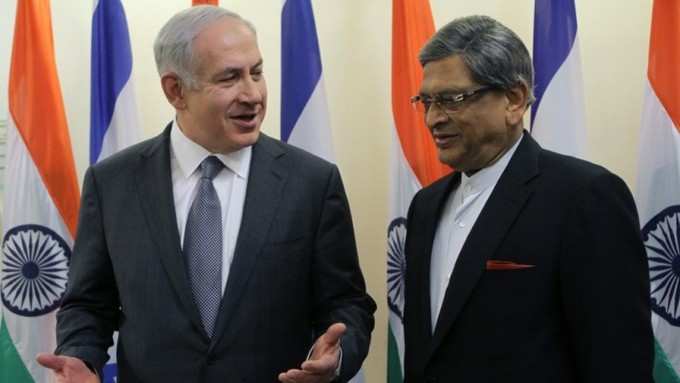
Amid a tight schedule and loads of time-consuming PR blitzkrieg organised by the Indian diaspora, Prime Minister Narendra Modi found time to meet his Israeli counterpart
In fact, India’s sour relationship with Israel dates back to 1938 when Mahatma Gandhi wrote that formulation of a Jewish country in the Middle East would be ‘a crime against humanity’. In 1949, the first Indian Prime Minister Jawaharlal Nehru voted against Israel joining the UN and in 1974 India became the first non-Arab country to acknowledge Palestine Liberation Organization (
Till two decades ago, India’s West Asia policy was solely driven by a few economic and political reasons. The country depends on Arab countries for oil and the remittances worth billions of dollars sent by Indians working in Gulf countries are a boost to the country’s GDP.
Successive Congress-led governments gave more weight to the reported perception of the Middle East crisis as a religions issue (and not a regional or diplomatic one) by around 170 million Muslims in India. In a sense, this involved a reductionist political logic that clearly supporting Israel and overtly opposing the Palestinian cause would mean loss of millions of Muslim votes.
The shift in India’s policy approach towards Israel began when it started realigning more closely with the US (which in turn has been supporting Israel) after the collapse of the erstwhile Soviet Union. Subsequently, in 1992, the then Prime Minister PV Narasimha Rao took initiative to establish full diplomatic relations between the two countries.
Over the last two decades, India’s engagement with Israel has grown significantly, especially in the fields of defence and trade. In 2012, of Israel’s arms exports worth $7 billion, India accounted for military equipment worth $1.5 billion. Today Israel is the second-largest supplier of military equipment to India, behind Russia. The military cooperation between the two countries became obvious when Israel supplied artillery shells during the 1999 Kargil conflict with Pakistan.
Trade between the two countries too surged from $200 million in 1992 to close to $4.5 billion in 2013, and in the process India also emerged Israel’s 10th largest trading partner.
Apart from growing military and trade alliances, India’s policy shift towards Israel is also marked by the resurgence of the political right-wing in India represented by BJP which is more ideologically sympathetic to Israel than Palestine. Vinayak Damodar Savarkar had supposedly believed that both Hindus and Jews should be empathetic to one another as both shared a history of oppression under Muslim rulers. The supporters of Israel in India also perceive the two countries mired in a common fight against Islamic terrorism. The BJP government is known to be keen on leveraging Israeli expertise in countering terrorism-driven problems within India and across its neighbourhood.
While Foreign Minister Sushma Swaraj insisted in July that “India supports the Palestinian cause while maintaining good relations with Israel,” the BJP government’s policy preference towards the Zionist state became apparent when it refused to bow to pressure from communist and Congress lawmakers to censure Israel in the Parliament for its recent siege of Gaza that has been decried by human rights activists across the globe.
While Israel is suspicious about India ties with Iran and India remains uncomfortable about Israel’s relationship with China, the meeting between Modi and Netanyahu implies that Modi, who visited Israel as chief minister of Gujarat in 2006, is poised to take bilateral relations between the countries to newer heights.
Image: timesofisrael.com